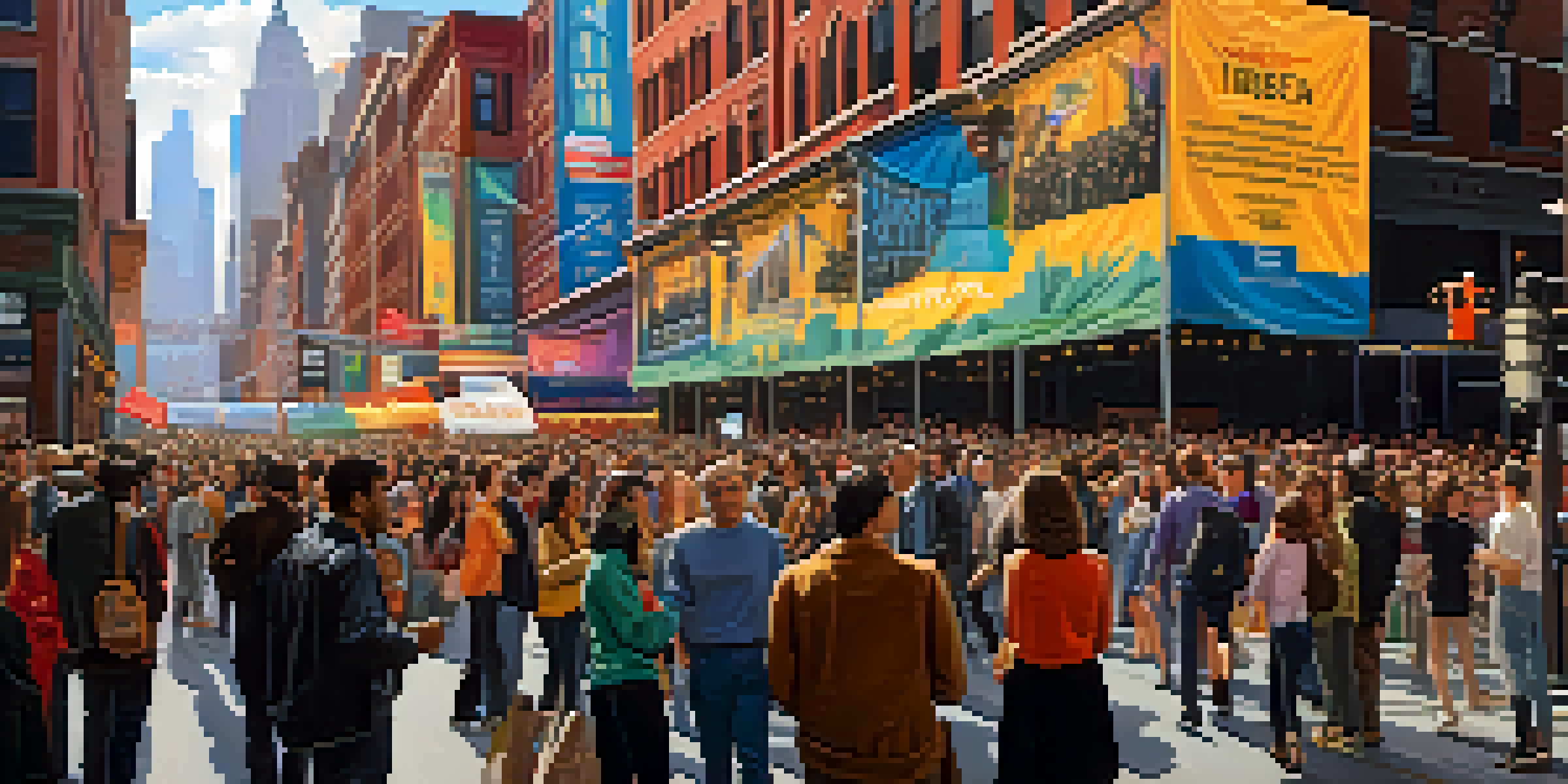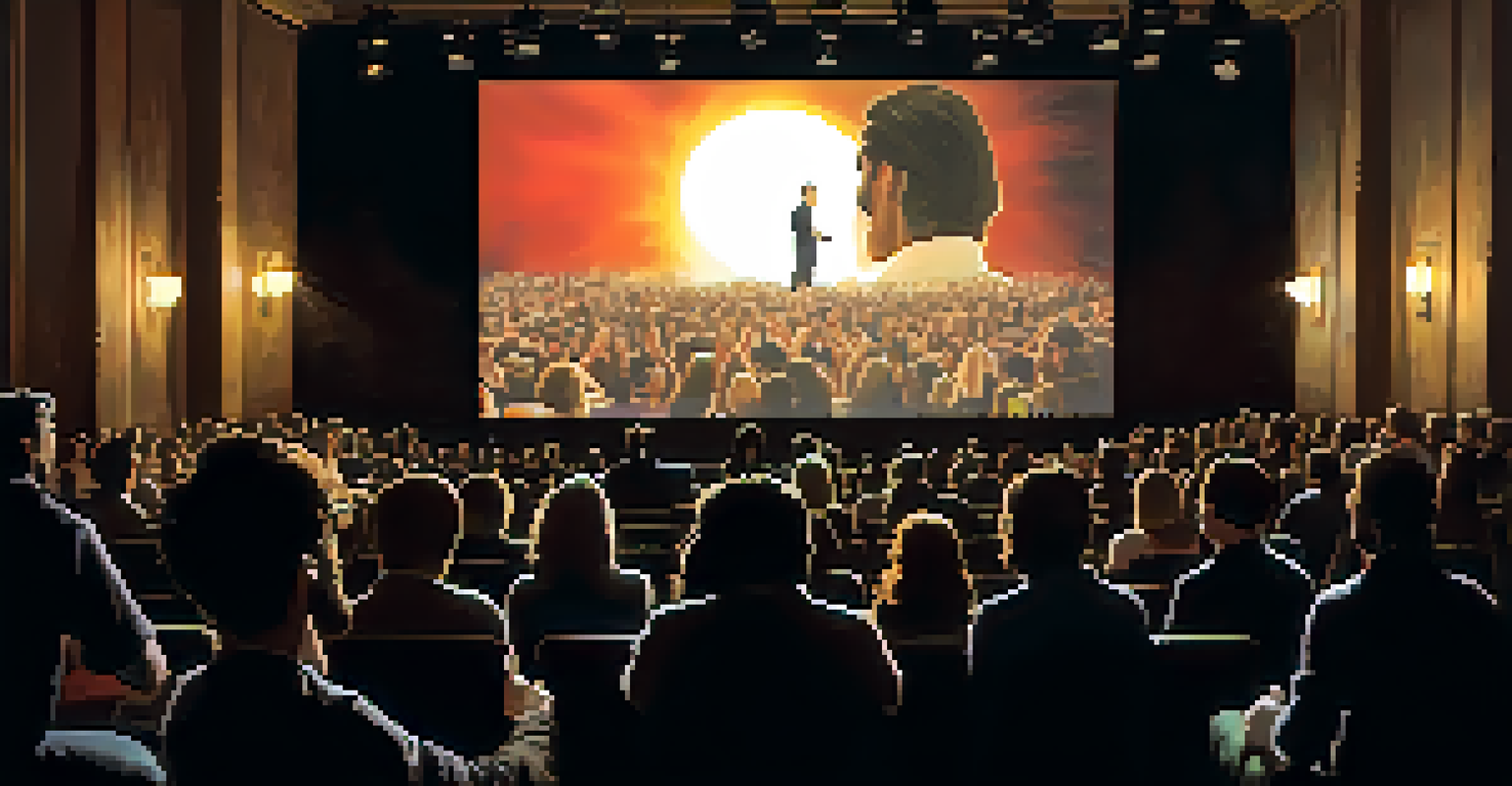Tribeca Film Festival: A California Perspective on Cinema

The Evolution of Film Festivals: A Brief Overview
Film festivals have become essential platforms for filmmakers to showcase their work and connect with audiences. The Tribeca Film Festival, founded in 2002, emerged in response to the September 11 attacks, aiming to revitalize lower Manhattan and celebrate the art of storytelling. This festival has grown not only in size but also in its influence across the globe, including in California, where the film industry thrives.
Film festivals are a place where stories come to life, connecting filmmakers with audiences in a meaningful way.
California, known as the birthplace of Hollywood, has a unique relationship with festivals like Tribeca. While the West Coast is home to iconic events such as Sundance and AFI Fest, Tribeca offers a different flavor with a focus on urban storytelling and innovative formats. This diversity enriches the cinematic landscape, allowing filmmakers from California to gain inspiration and connect with a broader audience.
As the film industry continues to evolve, festivals like Tribeca play a crucial role in shaping trends and pushing boundaries. They create opportunities for collaboration and dialogue among filmmakers, critics, and audiences, which are vital for fostering creativity. This dynamic is especially relevant for California filmmakers who often seek to explore new narratives and styles.
California Filmmakers at Tribeca: A Growing Presence
California filmmakers have increasingly made their mark at the Tribeca Film Festival, showcasing their diverse stories and perspectives. The festival serves as a launching pad for new talent, with many California-based projects receiving recognition and awards. This increased visibility encourages local filmmakers to participate, knowing their work can reach a wider audience beyond the West Coast.

The 2023 festival featured several films by California directors, highlighting themes that resonate with both local and global audiences. For example, stories touching on social justice, environmental issues, and personal narratives find a welcoming platform at Tribeca. This intersection of local storytelling with universal themes creates a vibrant dialogue among festival-goers.
Tribeca Elevates California Filmmakers
California filmmakers increasingly showcase diverse stories at Tribeca, gaining recognition and expanding their reach beyond the West Coast.
Moreover, networking opportunities abound at Tribeca, allowing California filmmakers to connect with industry leaders and fellow creatives. These interactions can lead to collaborations, funding opportunities, and distribution deals, which are essential for independent filmmakers. The festival thus becomes a crucial stepping stone for many seeking to elevate their careers.
The Unique Atmosphere of Tribeca: A Contrast to California
The atmosphere at the Tribeca Film Festival is distinctly different from that of California's film festivals. Set in the heart of New York City, Tribeca offers a bustling urban energy that contrasts with the laid-back vibe often found in California events. This difference can be invigorating for filmmakers, providing fresh inspiration from the city's dynamic culture and diverse audience.
Diversity is not just a goal; it’s an essential part of storytelling that enriches our understanding of the world.
Attendees at Tribeca experience a rich tapestry of events, from panel discussions to immersive installations, all designed to engage and provoke thought. In California, while there are similar offerings, the focus often leans more toward the glamorous aspects of filmmaking. This shift in focus at Tribeca encourages filmmakers to contemplate the social impact of their work, further enriching their creative processes.
This urban setting also allows for unique storytelling opportunities, as filmmakers can draw inspiration from the city's architecture, history, and diverse population. For California filmmakers, participating in Tribeca can broaden their perspectives and influence their future projects. Ultimately, this contrast enhances the cinematic experience for both creators and audiences alike.
Audience Engagement: Connecting with Film Lovers
One of the standout features of the Tribeca Film Festival is its emphasis on audience engagement. Unlike some festivals where industry professionals dominate, Tribeca prioritizes the voices of everyday film lovers, creating an inclusive atmosphere. This direct interaction allows filmmakers to receive immediate feedback, which can be invaluable for their creative journeys.
California filmmakers benefit from this unique engagement, as they can gauge audience reactions and adjust their narratives accordingly. The festival also hosts Q&A sessions and discussions, fostering a deeper understanding of the films and their themes. This level of engagement is often less pronounced at other festivals, making Tribeca a unique opportunity to connect with viewers.
Audience Engagement Is Key at Tribeca
The festival prioritizes direct interaction with everyday film lovers, allowing filmmakers to receive valuable feedback and connect more deeply with viewers.
Moreover, audience engagement at Tribeca extends beyond just watching films. The festival often includes workshops and networking events designed to empower attendees, providing them with tools and resources to navigate the film industry. This commitment to community makes Tribeca a valuable experience for California filmmakers looking to expand their horizons.
Tribeca's Focus on Diversity: A Model for California
Diversity is a core value at the Tribeca Film Festival, which actively seeks to showcase underrepresented voices in cinema. This commitment is reflected in the selection of films, which often highlight stories from various cultures, backgrounds, and experiences. California filmmakers can draw inspiration from this model, as they too seek to amplify diverse narratives in their work.
The festival's focus on inclusion encourages filmmakers to explore themes that resonate with all audiences, fostering empathy and understanding. Many California directors are already embracing this ethos, creating films that challenge stereotypes and illuminate marginalized voices. By participating in Tribeca, they can further develop these important narratives and connect with like-minded creators.
Additionally, Tribeca's efforts to promote female and LGBTQ+ filmmakers set a powerful example for California's film festivals. By prioritizing diversity in programming, Tribeca not only enriches the festival experience but also drives the industry toward greater equality. California filmmakers can learn from this approach, recognizing the importance of representation in storytelling.
Technology and Innovation at Tribeca: A California Connection
The Tribeca Film Festival is known for embracing technology and innovation, reflecting the evolving landscape of cinema. From virtual reality experiences to interactive storytelling, the festival showcases cutting-edge formats that challenge traditional filmmaking. This forward-thinking approach resonates with California filmmakers who are often at the forefront of technological advancements in the industry.
By participating in Tribeca, California creatives can explore new ways to tell their stories and engage audiences. The festival provides a platform for experimenting with immersive experiences and multimedia projects, encouraging filmmakers to think outside the box. This emphasis on innovation is especially relevant in a state known for its tech-savvy culture.
Tribeca Champions Diversity in Film
With a strong focus on inclusion, Tribeca highlights underrepresented voices, inspiring California filmmakers to amplify diverse narratives in their work.
Moreover, the intersection of technology and storytelling at Tribeca opens doors for collaboration between filmmakers and tech companies. California filmmakers can leverage these opportunities to integrate new technologies into their projects, enhancing their storytelling capabilities. As the film industry continues to evolve, events like Tribeca inspire filmmakers to adapt and embrace change.
Looking Ahead: The Future of Cinema and Tribeca's Role
As we look to the future, the role of festivals like Tribeca in shaping the cinematic landscape becomes increasingly important. With the rise of streaming platforms and changing audience preferences, film festivals must adapt to remain relevant. For California filmmakers, Tribeca represents a vital opportunity to showcase their work and connect with audiences in a rapidly evolving industry.
The festival's commitment to innovation, diversity, and audience engagement positions it well for future success. California filmmakers can benefit from this environment, as they seek to push boundaries and explore new narratives. The ongoing dialogue between filmmakers and audiences at Tribeca will help shape the future of cinema.

Ultimately, the Tribeca Film Festival serves as a beacon for filmmakers, inspiring them to tell compelling stories that resonate with audiences. For California's vibrant filmmaking community, participating in Tribeca is not just about showcasing their work; it's an opportunity to be part of a larger conversation about the future of film. As the industry evolves, the connections made at Tribeca will undoubtedly have lasting effects.